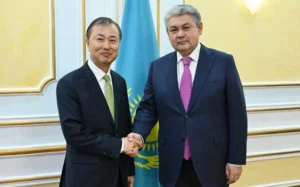South Korea’s forced labor plan crucial for better ties with Japan: President Yoon

Seoul, The Gulf Observer: South Korean President Yoon Suk Yeol on Tuesday defended his government’s contentious plan to use local funds to compensate Koreans enslaved by Japanese companies before the end of World War II, saying it’s crucial for Seoul to build future-oriented ties with its former colonial overlord.
Yoon said it resulted from government efforts to “respect the positions of victims while also seeking ways that would align with the common interests and future development of both South Korea and Japan.”
The plan aims to solve a years long impasse with Japan and solidify security cooperation among Seoul, Tokyo and Washington to better cope with North Korea’s nuclear threats and counter China’s regional influence. But it has met fierce opposition from forced labor victims, their supporters, and liberal opposition politicians, who have called it a diplomatic surrender and demanded direct payments and a fresh apology from Japan over the issue.
The plan announced Monday would offer reparations through a state-run foundation to a group of forced labor victims who had won landmark lawsuits against their former Japanese employers.
Japan has insisted all compensation issues were settled by the 1965 treaty that normalized relations between the two countries after it had colonized the Korean Peninsula for 35 years until the end of World War II.
The money to compensate the forced labor victims is likely to come from South Korean companies that benefited from that 1965 accord, which was accompanied by hundreds of millions of dollars in economic aid and loans from Tokyo to Seoul that were used in development projects carried out by the companies, including steel giant POSCO, which says it will consider contributing to the fund if requested.
Yoon said it was critical for South Korea to repair ties with Japan that deteriorated in recent years over grievances linked to Japan’s brutal rule of Korea from 1910 to 1945. Hundreds of thousands of Koreans were mobilized as forced laborers for Japanese companies, or sex slaves at Tokyo’s military-run brothels during World War II during that period.
Seoul’s plan to settle the forced labor issue could be a political gamble for Yoon at home, where many harbor deep resentment toward Japan over its colonial occupation. But experts say Yoon will continue to press to improve relations with Tokyo as he looks to strengthen South Korea’s defense in line with its alliance with the United States to cope with North Korea’s growing weapons program.


